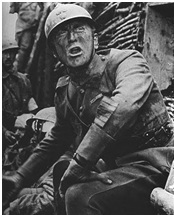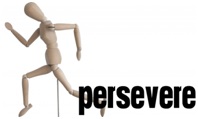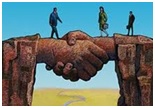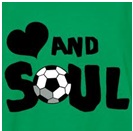|
 |
|
 |
|
|
||
Paths of Glory - Leadership and Ethics
Paths of Glory (1957)
Famous for...
Based on... American Humphrey Cobb’s 1935 novel, Paths of Glory. Director Stanley Kubrick (pictured right, also director of another famous anti-war film, Dr. Strangelove).
Oscars None. Key characters (all French soldiers) Colonel Dax (Kirk Douglas, pictured right). General George Broulard (Adolphe Menjou). General Paul Mireau (George Macready).
The story In a luxurious chateau General George Broulard (pictured right below) proposes that
General Paul Mireau’s division should capture an enemy position called the Ant
Hill. Mireau says this would be a suicidal attack for his exhausted troops but agrees to it after Broulard tempts him with promotion and personal glory. Mireau visits the trenches where he is out of touch and insensitive to ordinary soldiers including the three men he will later kill to save his reputation. Mireau (pictured right below):
Dax:
In the night before the attack, three men are sent out on a reconnaissance mission, but the drunken officer in charge (Lieutenant Roget) panics and kills one of them with a grenade. In his report to Dax, Roget claims the death was accidental, despite being accused of murder by the other
surviving group member, Corporal Paris. Mireau offers a toast of cognac “To France” in his comfortable and safe command post, as Dax and his men prepare to attack at dawn (pictured right). Thousands are killed by German machine guns and Mireau angrily notices that some troops are still in their trenches. His order to shoot them is ignored by an artillery officer, Captain Rousseau. Dax:
Dax’s bravery is to no avail and the attack on the Ant Hill is a disaster. Dax:
Mireau:
But with Broulard’s approval, Dax manages to:
They are all chosen unjustly:
Their trial in the chateau is unfair, ignoring:
Despite Dax’s passionate plea for compassion, they are all found guilty. They are given a last dinner (duck) by Mireau, but they can’t eat it because knives and forks are forbidden. Captain Rousseau tells Dax about Mireau’s order to shoot his own men, and Dax hopes that this will give the men
a last minute reprieve. His hopes are dashed by arrogant General Broulard who says the executions will encourage
and motivate the other troops. Just before they are executed, Ferol (pictured right) is petrified and turns to a priest for comfort. Arnaud (an atheist) remarks that whisky is his religion. Paris, who has a wife and family, simply says: “I don’t want to die”. Broulard:
But the outraged Dax:
Dax visits a tavern where drunken soldiers (including companions of the executed soldiers) listen to a frightened German girl (pictured right) sing a wartime love song. The soldiers join in, tearfully reminded of their homes and families. Dax then receives an order from Broulard to fight again immediately.
Lessons for leadership and ethics 1. Lead from the front Dax bravely leads his men into battle (pictured right), never flinching and always encouraging them. In contrast Generals Broulard and Mireau:
Before the attack Mireau drinks cognac, whilst the men face death.
2. Empathize Dax inspires his men because he:
He:
Broulard, Mireau and Roget are despised because they are all prepared to sacrifice their men to
get what they want. Mireau doesn't:
3. Persevere through pointlessness Dax has experienced the pointless butchery of the war, but he fights on to:
They all need psychological comfort. Of the three condemned men:
4. Character is crucial Not only in battle but also in his brave defence of the three convicted men, Dax is a man of:
Dax:
5. Mutual trust is marvellous People’s performance is best when there is mutual trust between:
The men don’t trust Broulard, Mireau and Roget, because they sacrifice them to save their reputation.
6. Fear can be fatal Broulard wrongly thinks that the executions will motivate the troops by instilling discipline. In fact, fear of death is leading to:
7. Co-operation requires common interests At the end of the film the soldiers are united by the song that reminds them of their:
They are all human beings and are happiest and most effective when their physical and psychological needs are being met. 8. People have feelings The fact that the singer is German reminds us that the Germans have feelings, too. The three condemned men are totally devastated by being unjustly chosen and tried for treason.
9. Idealism beats cynicism Dax’s humanitarian ideals are far superior to Broulard and Mireau’s cynical manipulation of their men. 10. Learn from failure Broulard fails to learn because he:
“Why should we have to bear more criticism and failure than we have to?”, he asks Dax.
Key quotes on war You can go to hell before I apologize to you now or ever again, Dax (to General Broulard). One way to maintain discipline is to shoot a man now and then, General Broulard.
Key quotes on ethics and influencing people You’ve spoiled the keenness of your mind by wallowing in sentimentality, Broulard (to Dax). There are times when I am ashamed to be a member of the human race and this is one such occasion, Dax (at the trial).
Two film websites to recommend 1. filmsite.org (run by Tim Dirks). 2. aveleyman.com (run by Tony Sullivan) |
|
|
||
|
|
||
| Copyright © wisdomtowin.com 2025 All Rights Reserved | ||
|


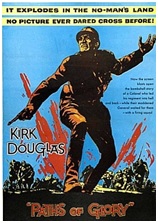
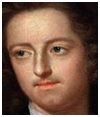

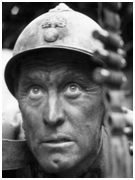

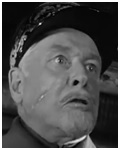
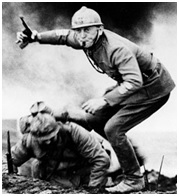
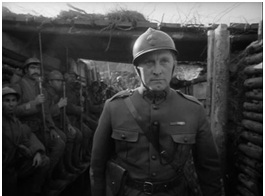


.jpg)
